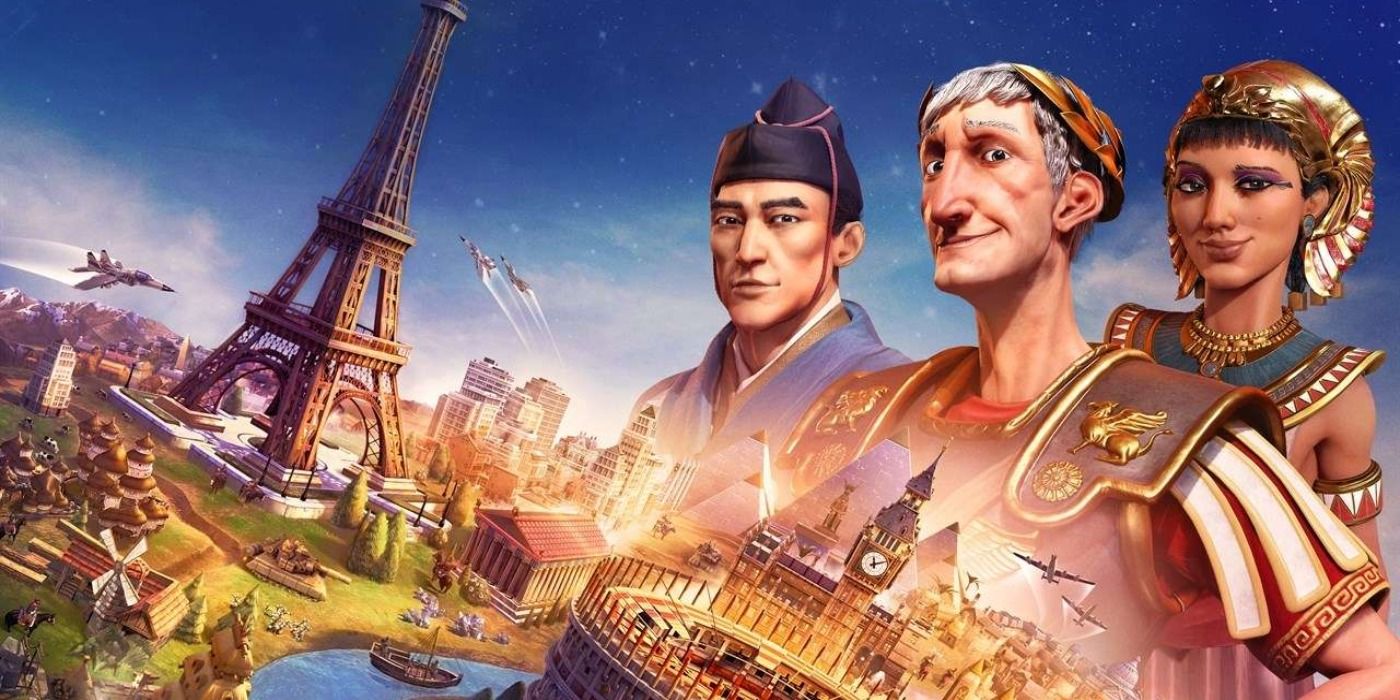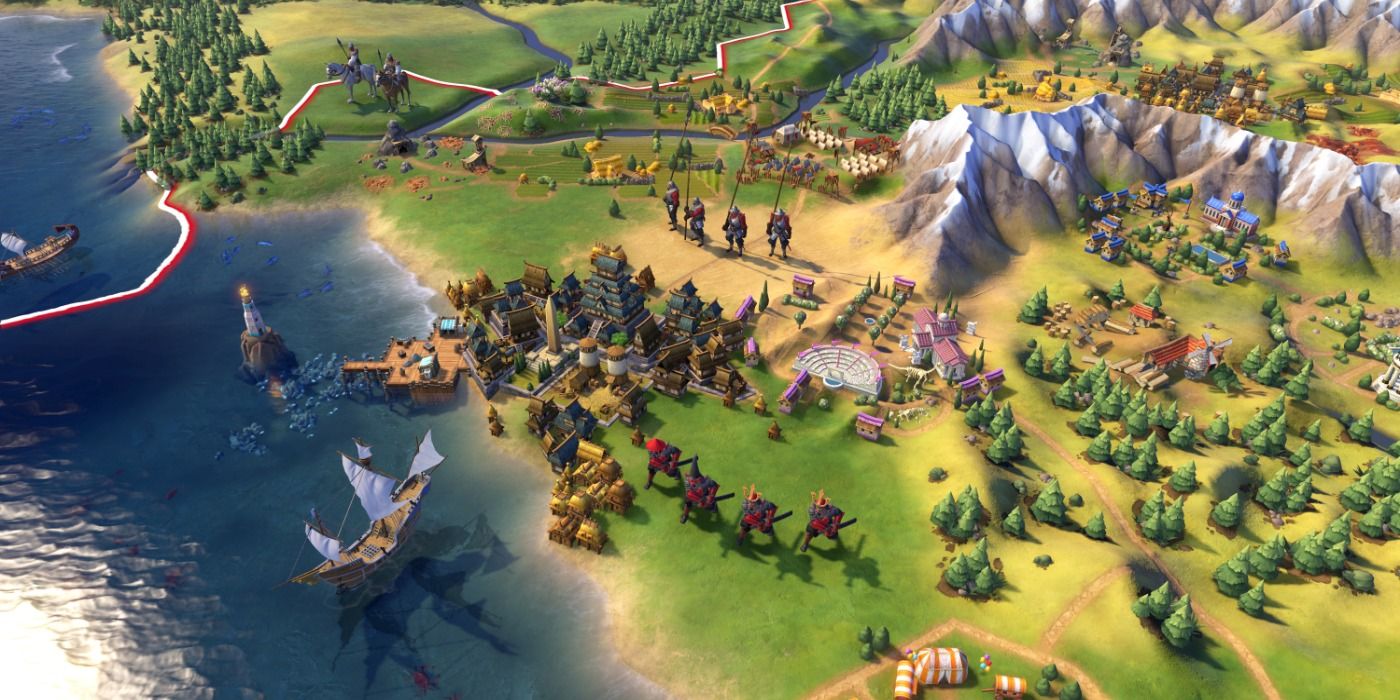With the addition of Sid Meier's Civilization 6 becoming free to play on the Epic Games store this week, there are a lot of new players trying out the game for the first time. That or people are interested in trying out the game after the announcement of its latest New Frontier expansion, which will release bi-monthly content for the next year. Whatever the occasion, there are many starting their first civilization kingdom, empire, or country. Civilization 6 has many mechanics that players must learn to understand how to play the game, and it can be quite daunting at first. Especially compared to Firaxis' other series, XCOM, where players lead a group of elite soldiers instead of an entire sprawling empire.
This guide will focus solely on civilizations found in the base game, not in the Rise and Fall, Gathering Storm, or New Frontier expansions. That way, new players can focus on the core aspects of the main game to keep it simple. New players might also start with the base game before moving on to the expansions, so this guide aims to help them in particular. In addition to these civilizations being easy to play, they will also help teach the newcomer the game's mechanics in a variety of ways. Here are 5 civilizations that beginners can easily grasp:
Best Leader Choices For New Players in Civilization 6
Sumeria
The first civilization players ought to pick was one of the first civilizations in existence: The Sumerians. They excel at dominating the early game and giving the player a head start in the ancient era in a variety of ways. Ziggurats can be built from the start of the game and yield science, and culture if placed next to a river on the map. A player’s primary science output will be from the campus district, which can take time to build, so having another method to gain science will let players spend their time building something else like a slinger or granary. The extra culture from river adjacency can also help teach players the importance of improvement placement, which is important to master for optimal tile yields.
Improvements require builders to make, which takes time to train. Or, players have a chance to acquire one through tribal villages scattered about the map if the player sends one of their units to investigate it. Sumeria’s Epic Quests ability can improve these odds further, as they obtain the same random bonus from clearing barbarian encampments; which could be a builder for your Ziggurats. To aid this task, and give Sumeria an edge in warfare, they can also build their Unique War Cart. With more attack strength, better movement, and no weakness to anti-cavalry units (which tend to guard barbarian encampments in the early game), they’re incredibly reliable.
Scythia
Straight from the Eurasian Steppe, the Scythians are experts at mounted warfare and a solid choice for domination victories. Whenever they train light cavalry units and their unique Saka Horse Archer, they’ll train an extra. This allows Scythia to train a military force relatively quickly, whether it's needed for offense or defense, and in turn spend more time building other things. As this bonus is only applied to light cavalry units, players can learn to distinguish light cavalry from heavy cavalry during their play as Scythia. Saka Horse Archers attack from a distance on horseback, their movement, and safe attack range making for a deadly combination.
Tomyris’ ‘Killer of Cyrus” Leader ability improves their military might further, granting bonus combat strength against weakened units and restoring some health every time they beat an enemy. With these passives, Scythia will become stronger as the war wages on and potentially overwhelm their opponent. Their Kurgan improvement helps their army in a different way, by providing gold yields to help pay for their unit maintenance costs. Kurgans also yield faith, which can help Scythia purchase religious units to spread their religion, though not as much as a Holy Site would provide.
Greece
Greece’s ability, Plato’s Republic, grants an additional wildcard slot permanently. Civilization 6 has a government policy mechanic, which lets players assign passive bonuses to their civilization depending on their current needs, so long as they have enough slots: Military slots are for military passives, for instance. Having a permanent wildcard slot, which lets any policy or special policies to be active, allows for passive flexibility that few other civilizations have. New players can use this advantage to have more options open for experimentation with the system. Coupled with the Greek Acropolis district that has an easy method of gaining culture (simply placing it on a hill next to the capital), players will unlock new civics quicker and more policies to try out.
Players have a unique choice when playing as Greece: Whether to play as Pericles, from Athens, or Gorgo, from Sparta. Both have differing leader abilities that take Greece's play-style in two directions. Pericles’ ‘Surrounded By Glory’ increases Greece’s culture output by 5% for every City State they are suzerain, or leader, of. Becoming suzerain requires having the most envoys sent to a city state. Luckily, every new Acropolis district grants a free envoy, so Greece has an easier time becoming suzerain. Gorgo of the Spartans has 'Thermopylae', granting a boost in culture equal to half their foes combat strength upon their defeat. Because unit strength increases over the course of the game, so will the bonuses the player receives! While Greece is a culture-based civilization, choosing which leader to determined by whether the player prefers diplomacy or warfare.
Rome
All Roads Lead to Rome when playing as Trajan. That’s also the name of Rome’s ability, which automatically creates roads between your new cities and the capital (provided they are in trade route range). Roads in Civilization 6 are created as a trade route reaches its target city and move units more quickly when traveled on, and Rome’s auto-built roads will easily set up mobility. Builder units can reach new cities more quickly to build farms, military units can rush to defend new settlements, and more! Another improvement Rome has easy access to is military fortresses. Normally, players would need to train military engineers, which aren't unlocked till around the middle of the game. Roman Legions, their unique unit, can build them once unlocked earlier in the game (One fort per Legion you build).
In addition to the early roads and forts, Rome will also gain a free city center building with Trajan’s leader ability. This changes depending on the current era, but will always be a monument in the first era. The minimal amount of culture the monument yields isn’t enough to compete in culture in the long run like Greece, but it’s a great start in the early parts of the game. Overall, Rome doesn’t lean toward any particular victory type, but can comfortably pursue all of them with their potpourri of bonuses. Not having to spend time building monuments or setting up roads allows players to spend their city’s production on other endeavors. For players experiencing Civilization 6 for the first time, Rome’s flexibility and easy set up can help ease them into the game.
Russia
While other civilizations scramble for territory, Russia is the only civilization in the base game capable of thriving in Tundra. Tundra tiles only yield one food and no production, which makes it difficult to build strong cities in the polar regions. But Russian Tundra gains +1 production and +1 faith, making them slightly better than the common plains tile. Russian cities also start with extra territory, letting them expand quickly. New players having a hard time competing against others for settler locations will find this bonus to their liking. Russia also has an easy time acquiring faith with their unique Lavra district. Replacing the Holy Site, this district is built quicker and grants great person points, which let the player attract a famous great person after enough are accumulated. Faith is required to purchase missionaries to spread religion, and Russia’s easy access through the Lavra will help the player build up faith and rack up great prophet points to found a religion exponentially fast.
Peter the Great leads Russia, and his Grand Embassy ability is a great ability for new players. Much like how Peter traveled to western Europe to modernize Russia during his rule, in Civilization, Russian trade routes to foreign cities yield bonus science and culture depending on how many techs and civics the target is ahead of Russia in. New players might be lacking science or culture during their game, so Peter’s ability will help them catch up on the tech tree using international trade routes. Those wanting to try out religion ought to try Russia for their improved faith yields, or those interested in recruiting a lot of great persons for cultural victories.
Which civilization suits a player is determined by what they want out of the game, whether it be military conquest, sending colonies to Mars for science, or other victories. By playing these civilizations, newcomers will be able to develop their own strategies and learn what game-play style suits them best.
Sid Meier's Civilization 6 is available for PC, Switch, Xbox One, PlayStation 4, and App Store.


